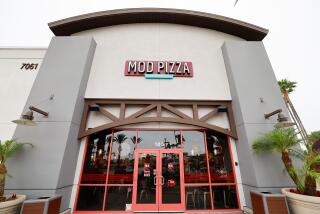Dual Role in Vicorp Deal Had Gordon Miles Worried
- Share via
SAN DIEGO — Gordon Miles admits he spent several restless, sleepless nights this year, concerned over his dual role as chairman of Vicorp Restaurants in Denver and as the principal investor in a management-led leveraged buy-out of Vicorp’s specialty restaurant division.
That restlessness has ended, but Miles might be excused if he still isn’t sleeping like a baby.
His newly spun-off Vicorp Specialty Restaurants, San Diego-based operator of 87 dining sites, is very much in debt as a result of the $112.5-million leveraged buy-out it completed last week. Equity in the spun-off firm totals about $12.5 million. The rest is all borrowed.
With that high a debt-to-equity ratio, the cost-cutting of the last month at VSR--operator of Piret’s, Hungry Hunter, The Boat House and Carlos Murphy’s--seems more predictable than surprising.
But the cuts have ended, both Miles and VSR President Thomas W. Doan insisted Monday at a news conference to explain the leveraged buy-out.
The debt doesn’t bother them, they added, because the businesses are profitable and the cash flow is strong.
“The pressure has always been on management here to develop as much profit and cash flow as possible,” Miles said. “I would hope there wouldn’t be more pressure. But a (private company) can’t do as many things” as a public company.
It was Miles’ role as chairman of Vicorp--very much a public company--and as the lead manager in the leveraged buy-out that caused no small stir at the Denver-based company.
Vicorp decided last spring to sell VSR, as part of its capital-raising efforts to complete the remodeling of the 170 former Sambo’s outlets it purchased last year. A leveraged buy-out was conceived after Vicorp was unable to find an outside buyer for its specialty restaurant division.
It was then, Miles said, that he became interested in the buy-out. He immediately “told my board of directors” of his intentions, he said.
There were several “ground rules” spelled out, according to Miles and Vicorp President Charles Frederickson, who this week also assumed Miles’ former positions of chairman and chief executive.
First, Miles couldn’t sell his Vicorp stock--about 500,000 shares, or 5% of the total outstanding. That way, he maintained his financial stake in the Denver company. The stock closed Monday at $13 per share.
Second, Miles couldn’t participate in the negotiations--either as a representative of the corporation or of the purchasing group. That job was left to the investment banking firm of Donaldson, Lufkin & Jenrette, one of several members of the investor group.
Third, two outside, independent “fairness opinions” had to be secured, said Miles, to ensure that the deal was beneficial to shareholders. Merrill Lynch and William Blair & Co., an investment banking firm in Chicago, issued reports, Miles said. In addition, a Vicorp stockholder director obtained a third opinion from Wedbush, Noble, Cooke in Los Angeles.
Miles personally invested about $2.5 million in the leveraged buy-out, about equal to the amount put up collectively by other VSR executives.
The ground rules helped safeguard against both an actual and seeming conflict of interest, according to Vicorp officials and analysts who follow the company.
Both the “company and Gordon Miles attempted to the best of (their) ability to prevent not only a conflict of interest (but also) the appearance of any impropriety,” according to Stan Erickson, Vicorp’s general counsel in Denver.
Michael Mueller, an analyst with Montgomery Securities in San Francisco, agreed: “It behooved Miles to do a transaction equitable to himself and to Vicorp shareholders.”
But the “single most telling” evidence that the deal was fair and square, said Frederickson, was that Vicorp last summer received another, competing bid to purchase VSR. That offer, from San Diego-based Foodmaker, was for less than the management offer, Frederickson said.
“If the offers had been close, our board would obviously have been inclined to favor the (Foodmaker) offer, simply to get around the perception that (we were) selling to insiders,” he said.
Many of the restaurants in the VSR group were once owned by Foodmaker, which in turn was once a subsidiary of St. Louis-based Ralston Purina before its own leveraged buy-out by management last year. Vicorp bought the eateries from Foodmaker in early 1984.
Foodmaker was interested because it appeared that Vicorp was “going to unload” VSR, according to Bill Rulon, Foodmaker’s secretary-treasurer.
The leveraged buy-out means that VSR will now concentrate on the dinner house aspect of Vicorp’s business, while Vicorp will be free to expand its family restaurants. That translates into a good deal both for Vicorp shareholders--who will reap a $20-million profit on the deal--and for the management group, analyst Mueller said.
“Family restaurants and dinner houses are two separate businesses . . . and are substantially different operationally,” he said.
The deal, he added, “allows management to pursue its own goals independently, and no longer as the division that was forced to work hard for the whole corporate entity, (where) its growth goals were secondary.”
For their part, Miles and Doan said Monday that they “won’t stray outside of existing concepts” at VSR, which, sometime in the next two years, will change its name to avoid confusion with Vicorp.
The executives said the dinner house trade is “in a trough” and predicted that, while demand will remain strong, there will be few new restaurants built.
As for Miles, things have calmed considerably since summer, when his office erected the proverbial “Chinese Wall” preventing him from discussing the proposed buy-out with his fellow executives.
“It was frustrating,” he acknowledged Monday. “When you’re used to running a large business and you can’t, it’s tough. I’d walk into the office and all the executives’ doors would shut.”
More to Read
Eat your way across L.A.
Get our weekly Tasting Notes newsletter for reviews, news and more.
You may occasionally receive promotional content from the Los Angeles Times.










